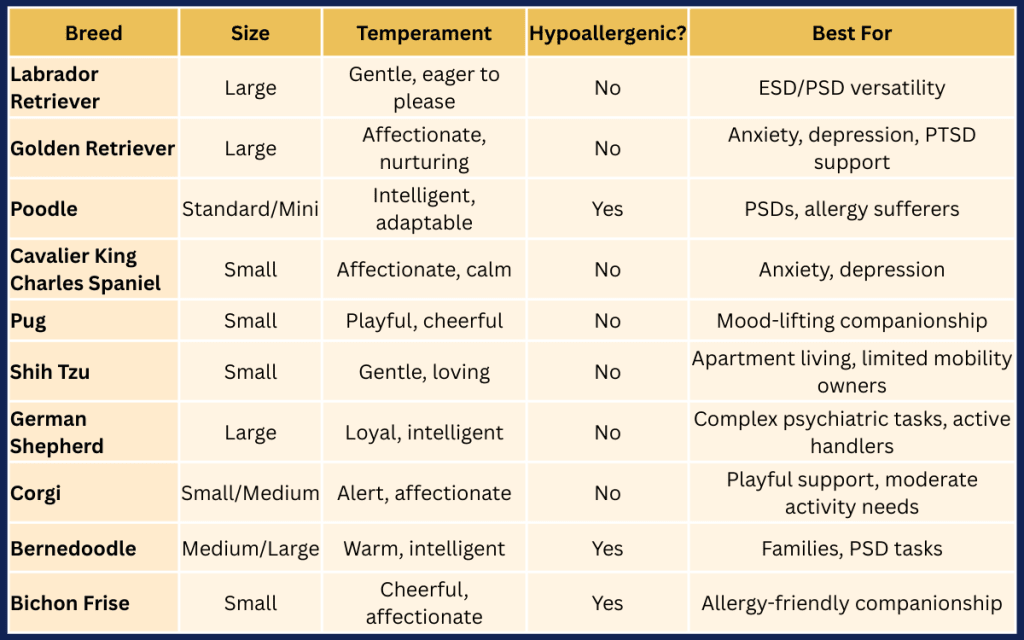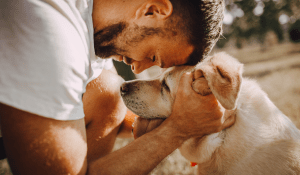The right dog can be more than a companion—they can be a source of stability, reassurance, and hope. Emotional Support Dogs (ESDs) offer comfort and emotional grounding, while Psychiatric Service Dogs (PSDs) are trained for specific tasks that help manage conditions like PTSD or severe anxiety. Though their legal rights differ, both can reduce stress, improve mood, and bring balance to daily life. The best dog breeds for emotional support and psychiatric service are those that combine emotional intelligence, calm demeanor, and high trainability. Choosing the right breed matters—temperament, size, and energy level should fit seamlessly into your lifestyle for the partnership to truly thrive.
Key Takeaways
- Breed choice affects support role success – The right dog breed can significantly impact how well they provide emotional or psychiatric assistance.
- Temperament is a top priority – Calm, intuitive, and affectionate breeds adapt best to emotional support and service work.
- Training needs vary by role – Psychiatric service dogs require advanced, consistent training, while emotional support dogs focus on companionship.
- Lifestyle match is essential – A dog’s size, energy level, and grooming needs should align with your daily routine.
- Allergy-friendly options exist – Breeds with hypoallergenic coats, like Poodles or Doodle mixes, are ideal for sensitive owners.
Key Traits That Make a Great Support Dog

Temperament & Emotional Intelligence
The best support dogs don’t just listen—they tune in. These are breeds with an intuitive sense of when to nudge your hand, when to curl into your lap, and when to simply be still. Golden Retrievers, Labrador Retrievers, and Poodles have a natural warmth, a calm steadiness, and an uncanny ability to read human emotion. They offer a balance of confidence and gentleness, never overwhelming, yet always present.
Trainability & Intelligence
For PSDs especially, intelligence isn’t about knowing party tricks—it’s about quickly learning complex, sometimes life-saving, tasks. Border Collies excel at task learning, Poodles combine smarts with hypoallergenic coats, and German Shepherds bring focus and stability that’s hard to match. These dogs thrive when given purpose and respond to clear, consistent guidance.
Size, Grooming & Practical Considerations
A city apartment dweller may not thrive with a high-energy Great Dane, just as someone with allergies won’t fare well with a heavy-shedding German Shepherd. Breeds like Poodles or Australian Cobberdogs are hypoallergenic, making them a better fit for sensitive owners. Matching a dog’s size, grooming needs, and energy to your lifestyle is as vital as choosing the breed itself.
Top Emotional Support Dog Breeds

Labrador Retriever
Gentle to the core, Labs have a knack for being everyone’s best friend. They’re steady, adaptable, and eager to please—qualities that make them a go-to choice for both ESDs and PSDs. Their trainability means they can handle everything from basic comfort to complex psychiatric support tasks.
- Large, gentle temperament ideal for varied support roles
- Highly trainable for both basic and advanced tasks
- Adaptable to different environments
Golden Retriever
Often called the quintessential family dog, Goldens bring an unmatched blend of empathy and enthusiasm. Their nurturing instincts make them ideal for anxiety, depression, and PTSD support, and they have the patience to sit quietly or engage in play depending on what you need in the moment.
- Naturally empathetic and affectionate
- Excellent with children and families
- Versatile in both calm and active settings
Poodle (Standard & Mini)
A Poodle’s intelligence is legendary, but their hypoallergenic coat makes them a practical choice too. They’re highly adaptable—equally content in a busy household or a calm, minimalist space—and can be trained for intricate psychiatric tasks.
- Hypoallergenic coat suitable for allergy sufferers
- Exceptional intelligence and trainability
- Works well in varied living situations
Cavalier King Charles Spaniel
Few breeds are as attuned to their owner’s emotions as the Cavalier. They’re small enough for apartment living yet carry a depth of affection that fills the room. For someone battling anxiety or depression, their devotion is a gentle constant.
- Compact size for small homes or apartments
- Extremely affectionate and attentive
- Low to moderate exercise needs
Pug
Playful and slightly comedic, Pugs bring joy simply by being themselves. Their charming personalities can help lighten heavy emotional days, offering a kind of mood-lifting companionship that’s hard to replicate.
- Naturally cheerful disposition
- Low maintenance in grooming and exercise
- Great for lifting moods and easing loneliness
Shih Tzu
For those in smaller spaces, Shih Tzus are calm, loving companions that thrive on close human contact. Their lower exercise needs make them manageable for people with limited mobility.
- Well-suited to apartment living
- Affectionate and people-oriented
- Requires regular grooming
German Shepherd
While they’re known for working in police and military roles, German Shepherds are equally skilled in psychiatric service. Their intelligence and loyalty mean they can learn to perform highly specialized tasks, though they do best with an active handler.
- Highly trainable for complex service tasks
- Protective and loyal temperament
- Requires significant physical and mental activity
Corgi
Corgis mix alertness with affection, offering companionship that’s as playful as it is comforting. Their smaller size makes them more manageable, though they still need regular activity to stay balanced.
- Playful and social nature
- Small to medium size but sturdy build
- Needs consistent exercise and mental engagement
Bernedoodle / Goldendoodle / Australian Cobberdog
These hybrids bring together the best of both worlds—the intelligence and hypoallergenic traits of Poodles with the warmth of Retrievers. The Australian Cobberdog, in particular, was purpose-bred for therapy and assistance work.
- Low-shedding, allergy-friendly coats
- Friendly, balanced temperament
- Great for both families and individuals needing therapy support
Bichon Frise, Beagle, Chihuahua, Border Collie
From the cheerful Bichon to the keen-minded Border Collie, these breeds offer specialized strengths. Whether you’re seeking compact companionship, high trainability, or playful loyalty, there’s an option here to suit different needs.
- Bichon Frise: Hypoallergenic, affectionate lap dog
- Beagle: Friendly, curious, and adaptable
- Chihuahua: Small, portable, and devoted
- Border Collie: Highly intelligent and task-driven
Psychiatric Service Dog Breeds
When it comes to PSDs, capability takes center stage. Labradors, Golden Retrievers, Poodles, and German Shepherds remain at the top of the list, but Border Collies offer unmatched focus, and Great Danes provide a grounding presence simply through their size and calm demeanor. The breed’s ability to perform specific, trained interventions is the deciding factor here.
How to Choose the Right Breed for You
Assess Your Needs
Emotional support focuses on companionship and comfort, while psychiatric service involves trained tasks tailored to specific medical needs. Choose based on whether you need daily emotional stability or targeted assistance with symptoms, and match the dog’s size to your available space.
Lifestyle & Energy Match
High-energy breeds like Border Collies require active households and consistent stimulation. Lower-energy breeds such as Cavalier King Charles Spaniels suit calmer lifestyles with shorter exercise routines.
Allergy Concerns
Hypoallergenic coats from breeds like Poodles, Cobberdogs, and certain Doodle mixes can make life easier for allergy sufferers. Grooming requirements and coat type should align with your comfort and maintenance capacity.
Training & Care Overview
Training Requirements
ESDs don’t need the formal training PSDs do, but basic obedience and strong socialization are essential. PSDs require rigorous, consistent training—often with professional guidance—to ensure they can reliably perform tasks.
Daily Care & Maintenance
All support dogs need consistent care: mental stimulation, exercise suited to their breed, and regular grooming. Meeting these needs sustains their emotional availability for you.
Ongoing Support & Legal Aspects
For ESDs, you’ll need an ESA letter from a licensed mental health professional to secure housing protections. PSDs, however, have broader legal access under the ADA, including entry to most public spaces.
Breed Comparison Table

- Labrador Retriever – Large, gentle, and eager to please; ideal for both emotional and psychiatric support roles.
- Golden Retriever – Affectionate, nurturing, and excels in supporting anxiety, depression, and PTSD.
- Poodle – Comes in standard or mini sizes; intelligent, adaptable, and hypoallergenic, making them perfect for allergy sufferers and psychiatric service work.
- Cavalier King Charles Spaniel – Small, calm, and affectionate; well-suited to apartment living and supporting anxiety or depression.
- Pug – Small, cheerful, and playful; excellent at lifting moods.
- Shih Tzu – Gentle, loving, and thrives in apartments or with owners who have limited mobility.
- German Shepherd – Large, loyal, and highly trainable for complex psychiatric tasks; best for active handlers.
- Corgi – Small to medium, alert, and affectionate; great for playful support with moderate activity needs.
- Bernedoodle – Medium to large, warm, intelligent, and hypoallergenic; fitting for families or psychiatric service roles.
- Bichon Frise – Small, cheerful, and affectionate; allergy-friendly and ideal for companionship.
Choosing the Best Dog Breed for Emotional Support and Psychiatric Service
Choosing a support dog is deeply personal—a blend of heart and practicality. The right breed will complement your emotional needs, fit your lifestyle, and bring joy in ways that go beyond their role. While we’ve named popular choices, the best match is the one whose personality, pace, and presence feel like home. At Emma & Buddy, we believe that the bond between human and dog is one of life’s most beautiful designs—crafted not just in appearance, but in trust, loyalty, and love.











